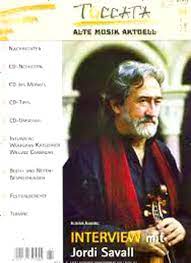Early music magazine shuts down
NewsWe have been notified of the death of Toccata-Alte Musik, the leading early-music magazine in the German speaking world.
Founded in Regensburg in 1985, TAM stacked up 309 issues, 500 interviews and around 15,000 CD reviews.
All over now.






Frankly, the entire early music movement should shut down for good. Produced nothing but chaff, with a handful of actually interesting pieces among thousands of execrable works. Of those 15,000 CDs, 14,999 of them are probably worthless. Worse yet, their specious claims of “authentic” performance practice infected the Classical and Romantic repertoires leading to the use of horrid period instruments and HIP applied like thick globs of merde over works to which such an approach is utterly unidiomatic, robbing much of current interpretive practice of individuality, subjectivity, imagination and passion. Good riddance.
Get down off that fence!
She didn’t put up the fence. They did.
I’ll never forget a rehearsal with one of these ‘experts’ who was the week’s guest conductor. We couldn’t “meow-meow” to his liking so he brought in a cassette deck to the next rehearsal to play a recording of his own ‘authentic’ ensemble in Europe. He wanted to show us how the music should be played. It was beyond insulting.
100% accurate.
I agree with you up to a point, Gabriel Parra Blessing.
The main things I don’t like about the HIP movement:
1) Everything is played much too fast (e.g.: McCreesh).
2) Many of the HIPsters do not seem to care about producing beautiful tone (e.g.: Il Giardino Armonico).
3) It caused an irreparable break in performing traditions.
4) It is a refuge for many “musicians” who do not have the technique or the imagination to succeed in the traditional musical realm.
However, I think you go a bit too far when you state “Of those 15,000 CDs, 14,999 of them are probably worthless.”
To your fourth point, early musicians are usually about 100x the “musicians” that “modern” performers are. Early musicians can read between the lines, improvise, compose, actually understand the music, and interpret it on the fly. Any idiot can read notes and markings and “interpret”, practicing a single program for a decade. This isn’t impressive, it’s oppressive. True musicians make music out of very little and in very little time.
“Produced nothing but chaff, with a handful of actually interesting pieces among thousands of execrable works.” Look, we classical-music buffs all know that REAL music began with Bach (though some might make a claim for Palestrina), but do you have to be so pushy about it?
Having a bad day? Take 10 deep breaths and look at some flowers. Does wonders!
Meditate on your navel and stick to Brahms then!!!
You mean there is more than one Early Music magazine in Germany? Unbelievable.
Just to give a more neutral perspective, I’ll offer this. I worked several years in a store in Berkeley, Ca that specialized in early music, The Musical Offering. Up to certain point in their history, they had a good working/business relationship with Harmonia Mundi Distribution. At that time, HMU distributed a number of very fine early music labels (and other sub-genre labels too). Most of those have now been taken over by Naxos, as HMU Dist. doesn’t exist any more – at least not in the U.S. We received many promotional copies to play in the store. Some of it was sort of classical wallpaper/Telemann like stuff (and I do enjoy getting all the Telemann buffs riled up!). However, much of it was really quite interesting, even to late a Romantic/early 20th Century fanatic such as myself. I thought every release that came out on Alia Vox involving Jordi Savall – or any member(s) of his family – was just outstanding. I wasn’t at all conscious of whether they were using period instruments, or borrowing instruments from the roadie for Black Sabbath – it just sounded like great music to me, done with real passion and commitment. Early instruments or not, I heard a number of interesting and fantastic sets of the Bach Brandenburg Concertos – all of them memorable in their own way (the set with Richard Egarr particularly sticks in my memory). Perhaps more to the point, I met a number of nice, fun and interesting people through the biannual (as I recall) early music festival that alternated between Boston and Berkeley. It was genuinely fun when somebody would bring in their contrabass theorbo to ‘show and tell’, or some other exotic instrument. I even got picked up one evening by a . . . . well, let’s just say that never happened to me at a Mahler or Richard Strauss concert, much less a jazz one.
There’s no question the early music ‘movement’ had reached its zenith, and was bound to decline a bit. Maybe even a lot. But I would be saddened to think that there’s no one out there to pick up the ball, or show some love to those who have kept the flame of early music going. To me, these people are no less legitimate than opera fanatics, or modern music fanatics, or P. Glass fanatics, or the fanatics for any number of other of ‘classical’ side shows and niches.
Well, well, one listens to the music one likes. Lots of awful prejudice in some comments here. Why the bad blood?
There are great, fine musicians in the Early Music movement, just as there are poseurs and marketing puppets doing 19th century music.
I fear the wrath of the Romantic masses breaking upon poor old Theatre des Champs Elysées…